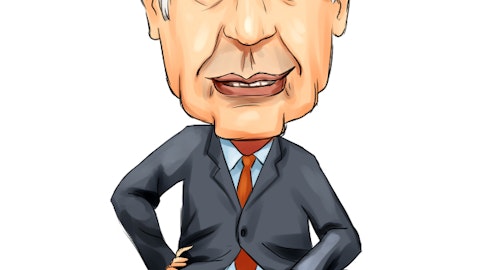Ghansham Panjabi: Thank you.
Timothy Donahue: Thank you.
Operator: Thank you. Our next question is from the line of Gabe Hajde from Wells Fargo. Your line is open. You may begin.
Gabe Hajde: Tim, good morning.
Timothy Donahue: Gabe, hold on a second. Hey, Elmer, you’ve got a connection problem, just be careful of that. Go ahead, Gabe.
Gabe Hajde: Is there any better?
Timothy Donahue: You’re better, yes.
Gabe Hajde: Okay. Thank you. I wanted to revisit Europe a little bit and ask about — I think you indicated market flattish. I appreciate it’s a regional market and it can vary by a player. I think there’s a Chinese competitor that’s adding a second plant there. It seems like it’s customer specific at this point but maybe that would be the market where we might see a little bit more competitive activity because I think contracts are a little bit shorter there. It seems like you guys are pretty well set in to ’24. You’re speaking highly confidently about next year. I’m just curious kind of revisit the question about utilization. Are there specific pockets or regions or kind of your antenna in terms of competitive activity or anything like that?
Timothy Donahue: Yes. The first thing I’d say about the Chinese competitor, they built the first plant in Belgium, customer-specific. They don’t — listen, they have advantages while they are in China. That is whether they are getting government-sponsored aluminum reductions and/or very cheap Chinese labor, they don’t have that same advantage in Europe. They are in Belgium, they are paying Belgian labor rates. And they are either importing cheap Chinese metal in or they are buying a European metal. So the challenges that you might foresee competing against the Chinese in China, not the same challenge competing against them in Europe or other markets. We are — we at Crown are more weighted towards the perimeter, that is the UK, Spain, Italy, Greece, Turkey.
And certainly, we have the one plant in France and now with the Helvetia acquisition, we now have a presence in Germany and then one in Slovakia. So I think that we were down a bit, the market probably flattish, maybe plus one, minus one, and that growth is probably weighted more towards Northern or North Central Europe where we’re not as prevalent. And — but as I said, we — as we sit here today, there’s no reason to believe we won’t have a — another increase next year, certainly not to the level we increased this year, but we get back to where we were in ’21. And we’ve got a capacity footprint with some new capacity, new high-speed very efficient lines to benefit the company well into the future. The sustainability story is alive and well in Europe as well.
So it’s the same sustainability story as we have in North America, maybe even more so.
Gabe Hajde: Okay. I sort of asked this, and I apologize, I’m going to try to squeeze in two more. And I’m definitely opening myself up for a little bit of criticism here. But the first one, anything — I know you guys have operated there for a long time, Middle East that you can comment on. I’m sure what’s going on right now is a little bit disruptive, but just help us with that maybe a little bit? And then secondly, it’s obviously gotten a lot of attention in headlines, and we wrote about it. Anything from your customers or conversations that you’re having in terms of obesity drugs and potential impact on sugary drinks?




